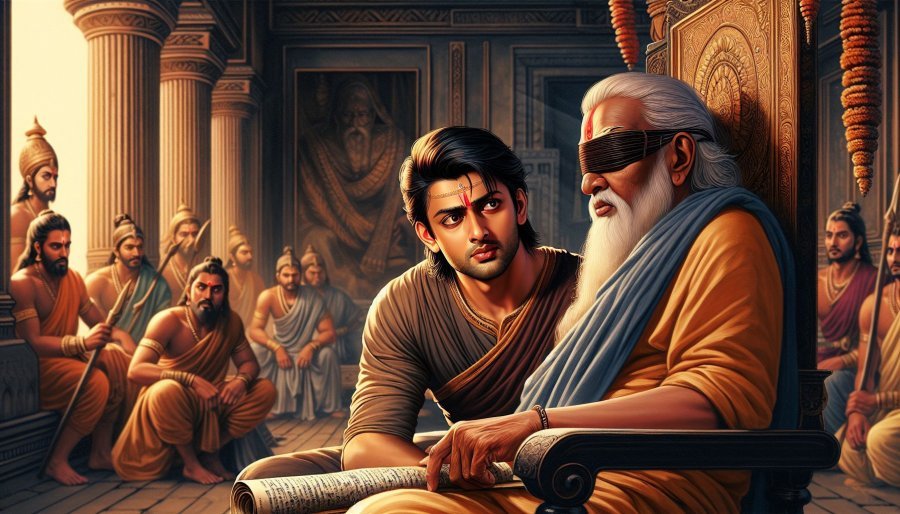Section XLIX [summary]
Book index: Mahabharata (English)
This page contains a summary of the Mahabharata Section XLIX including examples of moral lessons in daily life. The Maha-Bharata is one of the largest epics ever written containing roughly 100,000 Sanskrit verses. It deals with the legendary history of ancient India and contains a large number of interwoven tales.

Short summary of the chapter:
The story shared by Sanjaya to Dhritarashtra revolves around the events leading up to the great Kurukshetra war. Sanjaya highlights how the insult to Draupadi by Duryodhana and his brothers has angered the Pandavas, especially Arjuna, who has even fought and impressed Lord Shiva himself in disguise. The Pandavas' unmatched skill in warfare, coupled with their divine protection from Lord Krishna, makes them formidable opponents for anyone, even the gods. Dhritarashtra expresses his concern over the actions of his sons, particularly Karna, and the consequences they will face due to their wrongful deeds. He acknowledges the strength and determination of the Pandavas and fears for the safety of his own sons in the upcoming battle.
The insults and abuses hurled at Draupadi, the Pandavas' wife, serve as the catalyst for the impending war, as it enflames the Pandavas to seek vengeance against the Kauravas. Arjuna's extraordinary feats in battle and the divine support he receives from Lord Krishna make him a formidable adversary for the Kauravas. Dhritarashtra recognizes the power and wrath of the Pandavas, predicting that his sons and their allies will struggle to withstand their fury. The imbalance of righteousness and strength between the two sides foreshadows the inevitable clash and the potential destruction it will bring upon the Kauravas.
The Pandavas' righteous anger and their commitment to justice propel them towards the path of war, as they seek to avenge the dishonor inflicted upon Draupadi. Arjuna's exceptional prowess in battle, combined with the divine blessings bestowed upon him by Lord Krishna, make him a force to be reckoned with on the battlefield. Dhritarashtra laments the misguided actions of his sons, particularly Karna, and the dire consequences they will face as a result of their wrongdoing. The impending confrontation between the Pandavas and the Kauravas becomes inevitable, with the scales tipping in favor of the former due to their righteousness and superior abilities.
As the tensions escalate and the war grows imminent, the Pandavas' resolve remains unwavering, fueled by their desire for justice and retribution. The divine protection and guidance of Lord Krishna give them the strength and confidence to face their enemies on the battlefield. Dhritarashtra's apprehension and acknowledgment of the Pandavas' might foreshadow the impending conflict and the potential downfall of his own sons in the face of their adversaries' wrath. The stage is set for a colossal battle, where righteousness will clash with tyranny, and the destiny of the Kuru dynasty hangs in the balance.
Full English translation:
This page is merely a summary which is automatically generated. If you are looking for authentic sources such as the Sanskrit text or the Full English translation of Mahabharata Section XLIX, have a look at the following articles:
Section XLIX, online text
English translation by Kisari Mohan Ganguli.
Read this and other chapters online.
Mahabharata (English Summary)
by Kisari Mohan Ganguli | ISBN-10: 8121505933
Buy the latest edition:
FAQ of Section XLIX:
What was the reason for the Pandavas' anger in the assembly?
The insult to their wife Draupadi by Duryodhana and Karna. It further escalated due to harsh words from Dussasana.
Why did Bhima swear to smash Duryodhana's thighs?
Duryodhana showed his thighs to Draupadi, leading Bhima to vow revenge.
How powerful are the Pandavas in battle according to Sanjaya and Dhritarashtra?
They are unmatched due to their energy, expertise in weapons, and divine support. Arjuna's arrows can defeat even celestial beings.
Mahabharata Section XLIX in daily life:
The story highlights the consequences of arrogance, injustice, and the neglect of wise counsel. It shows how the actions driven by ego and the mistreatment of others, especially when done in a public setting, can have devastating long-term effects, not only on the victims but also on the perpetrators. In daily life, this serves as a reminder to treat others with respect and to be mindful of our actions and words. It teaches us the value of listening to advice, especially from those who have our best interests at heart, and the importance of recognizing our mistakes and correcting them before they escalate into larger problems.
Moreover, the story underscores the power of unity and the strength found in standing up against wrongdoings collectively. It demonstrates that while it may be challenging to confront those who do wrong, especially when they are in positions of power, there is strength in numbers and in the moral righteousness of one's cause. In daily life, this means having the courage to speak up against injustice and supporting those who have been wronged. It is a call to cultivate the qualities of integrity, loyalty, and resilience in the face of adversity. By embodying these values, individuals can navigate life's challenges more effectively and contribute to a more just and harmonious society.
